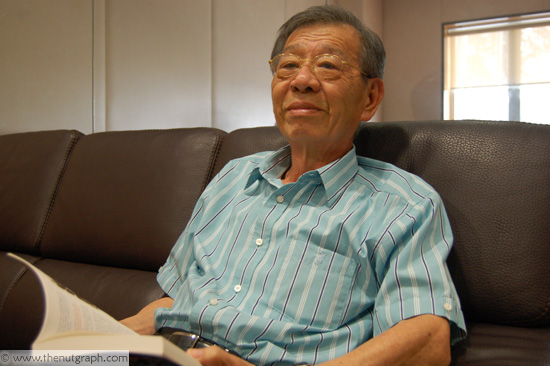THE federal government has prevailed yet again in keeping secrets from the Malaysian public. On 25 Feb 2011, the Court of Appeal overturned a High Court decision compelling the disclosure of an audit report and a 2004 water concession agreement.
How are the audit report and the agreement significant? And why did the Court of Appeal overrule the High Court decision to make public the documents? What reasons did the higher court cite for denying the public the right to know about something as fundamental as the price of water?
The documents
The signatories to the concession agreement were the federal government, Syarikat Bekalan Air Selangor (Syabas) and the Selangor government, then under the Barisan Nasional (BN). The concession agreement granted Syabas the right to supply water to Selangor and detailed the conditions Syabas had to meet to raise tariffs.

Lim Keng Yaik
In October 2006, Syabas raised water rates by 15%. This was on the basis that it had met the requirement to decrease non-revenue water (NRW), namely the difference between water produced and lost through leakages and such, by five percent. The five percent decrease in NRW was apparently supported by an auditor-general’s report.
Subsequently, the Malaysian Trades Union Congress (MTUC) and 13 others requested for a copy of the concession agreement and audit report from the energy, water and communications minister. This request was refused by the then minister Tun Dr Lim Keng Yaik, reportedly on the grounds that the documents were confidential and secret. On this basis, a judicial review was brought against the minister’s decision not to release the documents.
High Court
The High Court ruled that both documents must be released. Judicial Commissioner Hadhariah Syed Ismail said the concession agreement was not a private agreement, but was executed with the public’s interest in mind. She ruled that the disclosure of the documents was not detrimental to national or public interest but instead, would serve public interest by keeping them informed of the government’s workings.
Hadhariah said this in her judgment: “In this area, where transparency, accountability and priority are given to the needs of the rakyat, it is only fair that the concession agreement be made public. I am of the view that courts should lean in favour of aggrieved parties in matters involving public interest.”
She also ruled that the audit report was not a secret document merely because it was put before the cabinet for discussion, as argued by the federal government, and therefore should also be disclosed.
In addition, Hadhariah said the applicants had locus standi, or the right to bring the action, as they were paying water consumers within the area covered by the concession agreement.
Court of Appeal
So far, so good. But the federal government appealed and with a majority of two out of three, the Court of Appeal overturned Hadhariah’s decision.

The public is already largely skeptical of the judiciary's independence and integrity
It appears the full written judgment is not yet available. But from reports of what was said in court, the judges chose to reject the applicants’ request on the basis of locus standi. Judges Datuk Paduka Zaleha Zahari and Datuk Wira Abu Samah Nordin held that the MTUC and 13 other applicants were not “adversely affected” by the minister’s decision not to disclose the documents. The judges said the issue did not concern the denial of water supply, but was about the increase of water tariffs, and the applicants could not establish a basic and fundamental right to the documents.
Reports were silent on whether the two judges, when overturning Hadhariah’s decision, referred to the issues of transparency, accountability and the public interest in knowing the government’s workings.
Dissenting Court of Appeal judge Datuk Mohd Hishamudin Mohd Yunus had a different take on the issue from his two colleagues. He said that because water was a basic necessity of life, any increase in tariffs would have an important impact on lives. As such, the process of determining water tariffs had to be transparent and the public had a legitimate expectation to know the process involved in setting tariffs.
The courts are, of course, entitled to apply a strictly legal perspective in reaching their decision. There is, unfortunately, local precedent for the narrow interpretation of locus standiapplied by the majority in the Court of Appeal. But with the courts still struggling to convince a largely skeptical public of the judiciary’s independence, this decision is not only disappointing. It is also damaging to the judiciary’s perceived independence and integrity.
Something to hide?
The judiciary aside, isn’t it also about time the federal government stopped resorting to secrecy to justify their dealings?
Disappointing as it is that the Court of Appeal chose to apparently ignore the public interest in this matter in favour of technicalities, what is more disappointing is this: Why did this case have to go to the courts in the first place? Why did the federal government choose to classify secret a water concession agreement affecting all water consumers in Selangor; and an audit report financed by Malaysian taxpayers? What does the government have to hide?
The documents the Court of Appeal recently denied are just the latest additions to the long list of letters, papers and discussions which the government thinks we shouldn’t know about.
Amongst the documents the BN government has declared secret in the past under the Official Secrets Act are:
• The Bakun Dam environmental impact assessment reports, at the height of opposition against the dam in the 1990s
• The Air Pollutant Index, when Malaysia was blanketed in thick haze in 1997

Some of the damage caused by the Bukit Antarabangsa landslide of December 2008 (pic courtesy of Raj Kumar)
• The Public Works Department’s investigation report on the 2008 Bukit Antarabangsa landslide, which killed five people
• The federal government’s agreements with highway concessionaires, which included details on toll hikes
• Anti-Corruption Agency investigation papers on alleged corruption by former International Trade and Industry Minister Tan Sri Rafidah Aziz and former Malacca Chief Minister Tan Sri Abdul Rahim Thamby Chik
Transparency and accountability
In this age where even spy activities can be disclosed because of overriding public interest, it seems almost unthinkable that our government still pleads “official secret” to justify hiding information.
As Centre for Independent Journalism director Sonia Randhawa said in an article on freedom of information, “…there should be good, tight reasons for having secrets. It should be about protecting us, not protecting corruption.”
But until the government starts being as transparent and accountable as they keep claiming they will be, we can only guess whether their secrets are meant to protect us, or protect themselves.
Ding Jo-Ann has a good guess whom the government is actually protecting. Courtesy of Nut Graph



No comments:
Post a Comment
Note: Only a member of this blog may post a comment.